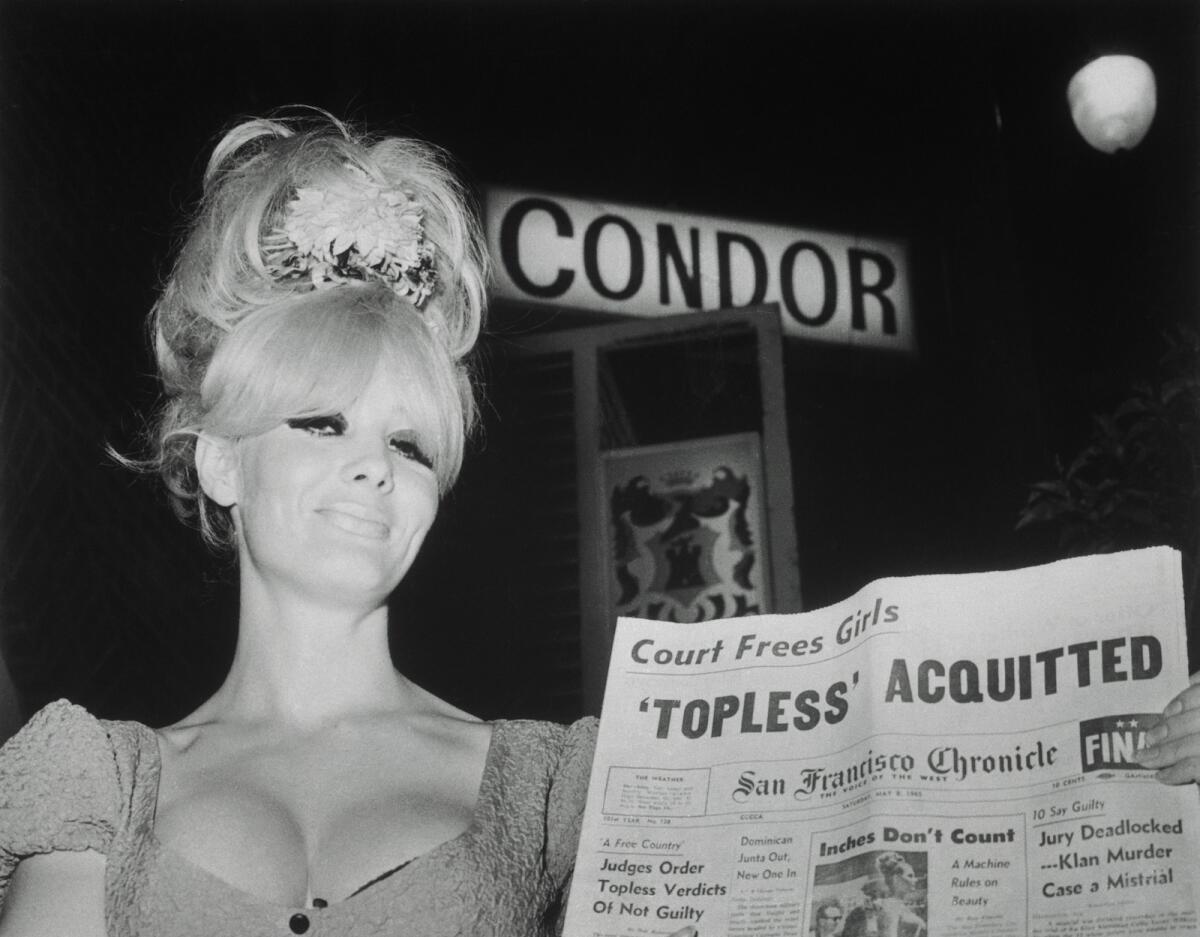Review: ‘Carol Doda Topless at the Condor’ takes a fresh, frisky look at a 1960s rebel

San Francisco’s own Botticelli’s Venus was nightclub dancing goddess Carol Doda, her scallop shell a white baby grand piano supported by hydraulics and descending from a hole in the ceiling rather than surfacing from the sea. But also, in perhaps the key difference from that painting, hardly so modest as to cover her breasts with a coy hand.
After all, Doda delivered herself here to shimmy topless, and in being the first to do so, shook up 1960s culture as well. The Golden Gate may have been the only attraction more popular in the Bay Area, but from her perch at the Condor in the lively North Beach entertainment scene, Doda’s celebrity was a bridge too, to a new era of sexual liberation. The story of her rise from waitress to wowza in a turbulent era — and all the ways her revolution excited and was exploited — is engagingly told in the frisky, funny, archive-rich look-back “Carol Doda Topless at the Condor” from filmmakers Marlo McKenzie and Jonathan Parker.
Like one of those energetic Martin Scorsese montages where we’re privy to how a vibrant underground ecosystem works, the documentary pulls us inside a partying milieu of lights, stage gimmicks, fad dances and tough, colorful characters, a handful of whom are interviewed here alongside a few cultural commentators. That’s because Doda forgoing pasties on June 19, 1964, may have ignited a craze — topless bands, topless shoeshines, a topless clam chowder joint and, eventually, bottomlessness — but as the film vigorously posits, it also reflected a wider societal shift, of people unburdening themselves from old ways, fighting for civil rights and equal rights and against war. And, as Doda once was, getting arrested for it too.
When Doda went big, she also did the American thing of going bigger, turning to dozens of silicone injections (her own hydraulics, in a way) that gave new meaning to the pair of consonants in her last name. The lines outside swelled too. Be forewarned that for all the plentiful nudity in “Carol Doda,” there’s also a surgery clip of what those injections looked like, and a grim side-effects story from similarly augmented exotic dancer Judy Mamou that makes clear the risk so many women went through to change their bodies.
Simon Baker and Natasha Wanganeen deliver a pair of remarkably synchronized, understated performances in director Ivan Sen’s “Limbo,” as much last-chance western as stark crime drama.
If Doda ultimately comes off as barely more (ahem) fleshed-out than the snapshot of an unflappable, charismatic, competitive workhorse we’re introduced to, it’s hardly for lack of trying on the directors’ part. In becoming famous for baring all, we sense, she remained adept at giving away very little, save the bits and pieces that the interviewees who knew her can recall gleaning: probably an abusive childhood, clearly a bad early marriage, a rarely satisfying dating life. (Even alone, sleeping with what she referred to as “them” didn’t sound so easy.)
Rather, she lived to perform, returning an insistent male gaze with a chest-forward independence that only burnished her global recognition. Today’s ever-sharing online influencers would hardly recognize her kind of cagey public personality (something one could argue she helped pioneer as well). It’s appealing to watch her in archived interviews bat away questions with wry shtick and terse honesty about her notoriety. If we’re made to detect pity toward her about anything from the film’s adoring tone, it’s that Doda wasn’t the greatest at diversifying or monetizing her appeal — getting out of the Condor took decades, well into North Beach’s swerve toward ever more dangerous sleaze-ification.
The attempts to paint Doda, who died in 2015, as a feminist trailblazer (especially from one enthusiastic on-camera cultural critic) can feel a tad oversold — the reality of her choices is as complicated as they can seem invigorating. But as a portrait of an offbeat showbiz world pushing the boundaries of expression, led by a no-holds-barred icon, “Carol Doda Topless at the Condor” is a buoyant tribute to a life of exposure.
“Carol Doda Topless at the Condor”
Rated: R, for nudity/graphic nudity throughout, some sexual material, language and drug content
Running time: 1 hour, 40 minutes
Playing: Starts Friday, Landmark Nuart, West L.A.
More to Read
Only good movies
Get the Indie Focus newsletter, Mark Olsen's weekly guide to the world of cinema.
You may occasionally receive promotional content from the Los Angeles Times.







